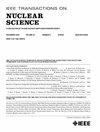LELAPE: An Open-Source Tool to Classify SEUs According to Their Multiplicity in Radiation-Ground Tests on Memories
IF 1.9
3区 工程技术
Q3 ENGINEERING, ELECTRICAL & ELECTRONIC
引用次数: 0
Abstract
This article presents Listas de Eventos Localizando Anomalías al Preparar Estadísticas (LELAPE), an easy-to-use tool that aims at classifying the single-event upsets (SEUs) that were observed in radiation-ground experiments on a memory or a field-programmable gate array (FPGA) into single-bit upsets (SBUs) and multiple-cell upsets (MCUs) with various multiplicities. This tool takes as input one or several datasets obtained in radiation experiments and returns as output the list of events that were identified, without any limitation on the type of device (SRAMs, DRAMs, PSRAMs, FPGAs, and so on) or manufacturing technology (planar, FinFET, and so on). The classification method used consists in analyzing statistical anomalies found in the input dataset(s) that would not be found in a theoretical scenario where only single-bit upsets (SBUs) can occur. It will be proven that the prediction accuracy attained is very high, by using data issued from actual experiments carried out by the authors on several SRAMs under protons and neutrons with various energies. This tool has been made available to the Community through a Zenodo repository and protected by the European Union Public License (EUPL).LELAPE:根据存储器辐射地面测试中的 SEUs 倍率对其进行分类的开源工具
本文介绍了 Listas de Eventos Localizando Anomalías al Preparar Estadísticas (LELAPE),这是一种易于使用的工具,旨在将在存储器或现场可编程门阵列(FPGA)辐照实验中观察到的单次事件颠倒(SEUs)分为单比特颠倒(SBUs)和具有不同倍数的多单元颠倒(MCUs)。该工具将辐射实验中获得的一个或多个数据集作为输入,并将识别出的事件列表作为输出返回,对器件类型(SRAM、DRAM、PSRAM、FPGA 等)或制造技术(平面、FinFET 等)没有任何限制。使用的分类方法包括分析输入数据集中发现的统计异常,这些异常在理论情况下是不会出现的,因为理论情况下只可能出现单比特中断(SBU)。通过使用作者在不同能量的质子和中子作用下对多个 SRAM 进行的实际实验所获得的数据,可以证明预测精度非常高。该工具已通过 Zenodo 存储库提供给社区使用,并受到欧盟公共许可证(EUPL)的保护。
本文章由计算机程序翻译,如有差异,请以英文原文为准。
求助全文
约1分钟内获得全文
求助全文
来源期刊

IEEE Transactions on Nuclear Science
工程技术-工程:电子与电气
CiteScore
3.70
自引率
27.80%
发文量
314
审稿时长
6.2 months
期刊介绍:
The IEEE Transactions on Nuclear Science is a publication of the IEEE Nuclear and Plasma Sciences Society. It is viewed as the primary source of technical information in many of the areas it covers. As judged by JCR impact factor, TNS consistently ranks in the top five journals in the category of Nuclear Science & Technology. It has one of the higher immediacy indices, indicating that the information it publishes is viewed as timely, and has a relatively long citation half-life, indicating that the published information also is viewed as valuable for a number of years.
The IEEE Transactions on Nuclear Science is published bimonthly. Its scope includes all aspects of the theory and application of nuclear science and engineering. It focuses on instrumentation for the detection and measurement of ionizing radiation; particle accelerators and their controls; nuclear medicine and its application; effects of radiation on materials, components, and systems; reactor instrumentation and controls; and measurement of radiation in space.
 求助内容:
求助内容: 应助结果提醒方式:
应助结果提醒方式:


